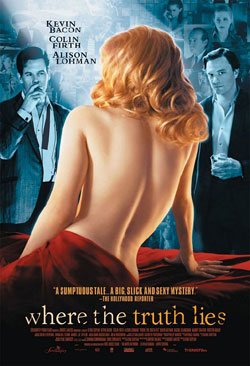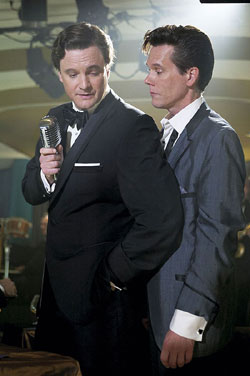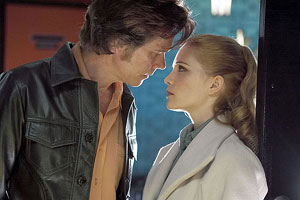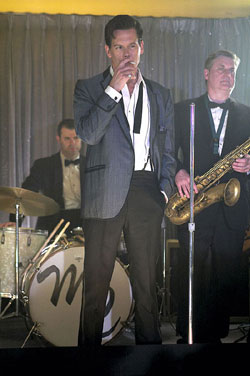 You may remember reading something recently about the fracas surrounding Atom Egoyan’s new film, Where the Truth Lies. The movie earned itself an NC-17, thanks to a three-way sex scene between Colin Firth, Kevin Bacon and Rachel Blanchard. In the end the decision was made to release the film unrated rather than accept the MPAA’s ruling.
You may remember reading something recently about the fracas surrounding Atom Egoyan’s new film, Where the Truth Lies. The movie earned itself an NC-17, thanks to a three-way sex scene between Colin Firth, Kevin Bacon and Rachel Blanchard. In the end the decision was made to release the film unrated rather than accept the MPAA’s ruling.
The film itself is a mystery, based in two time periods. Vince (Firth) and Lanny (Bacon) are a musical comedy duo, big stars. But something happens and the partnership is split. In the 70s an attractive young reporter (Alison Lohman) investigates just what happened to end the partnership, opening old wounds and solving old murders.
Kevin Bacon was recently in New York City promoting the film and an exceptionally small group of reporters had a chance to sit down with him in a New York City hotel room and talk about the film. Of course the first question I had was about the rating.
Q: The obvious question about this film is the NC-17 controversy. Do you think that helps the film or hurts it?
Bacon: I don’t think the controversy helps the film. I am kind of shocked and certainly disappointed. I don’t really understand it. I could hypothesize about it. When Atom Egoyan went to the MPAA and they gave us the NC-17, or said, ‘We’re going to give it to you,’ they made some suggestions about things that could be changed. He tried and delivered a couple more cuts to them, and both times they said, ‘No, it’s still going to be an NC-17.’ At which point there was some press that ran about that, because I don’t think it happens all that often that a mainstream American actor is in an NC-17 film. There were some gossipy columns about it, which in a way may have made the board want to dig their heels in because you don’t want to overturn a rating based on the fact that it was on Page Six or whatever.
He then went out to Los Angeles to appeal the rating. There’s a separate appeals board, which is a ten member panel. He went and took one of the actresses from the movie, and took a letter that I wrote, and said, ‘What I was trying to do here was not make a softcore porn film. This is a film about celebrity, not a sex romp.’ There were ten members of the panel and twelve people in the room. He asked who the other two people, and they said, ‘Members of the clergy. They’re here to discuss this with us.’ A Catholic priest and an Episcopalian minister, I think. There were six votes to overturn the rating, and four to keep it, but you need seven votes, you need a two-thirds majority, to overturn a rating.
So the movie’s going out unrated. As we’ve said before, nobody ever made this movie so kids could go to it. It’s not a kid’s movie. I don’t think it’s offensive for a 16 year old. I have a 16 year old and he’s watched plenty of stuff like this. But that’s not the point. First off, there are newspapers that won’t even carry an ad. There are theaters and theater chains that won’t run it based on the fear that there will be some kind of uprising in the community from people who haven’t seen the movie. There are certain media outlets where I have been rejected as a guest, based on the controversial nature of the film. And more importantly, it’s just misleading in terms of the content. It’s a murder mystery with the backdrop of a 50s musical comedy team with a dead girl showing up in the bathtub. I mean, it’s not Emmanuel 5.
 Q: Do you think that if the film came out ten years ago things might have gone differently?
Q: Do you think that if the film came out ten years ago things might have gone differently?
Bacon: When was Wild Things made? Full frontal male nudity and plenty of lesbian action and a threesome. That was an R and they didn’t think twice about it.
Q: So you think the rating is part of the times we live in?
Bacon: Definitely. Whether it’s conscious or subconscious. We live in a time when there’s less separation in church and state than maybe there has been since the 50s.
Q: Did you read the novel this is based on?
Bacon: I read the novel after I got the part.
Q: Were there a lot of changes made for the movie?
Bacon: In general the book is – as all books are – much more complex. He does more stuff, more scenes happen. The act in the book, the Vince character is the singer. He’s not British. There are definite kind of differences. In some ways – and in a great way, I loved the book – the book is even more fantastical and over the top and even more stylized than the movie is. I think it has an almost crazier kind of sense of humor. But that’s just Atom’s imprint.
Q: Atom is someone who doesn’t make movies in Hollywood and doesn’t live in Hollywood. Do you think his take on the star making machinery is different as a result?
Bacon: I think he’s making a movie that is a genre film that is very different from something he has done before, content-wise. The fact that it all takes place in the States, the fact that it’s got an American character like Lanny, the fact that it’s a whodunit is not really what he’s done before, but I think he definitely gives it his own sort of feel in terms of pace and his eye for complexity in characters and secrets and the darker side of the human condition. These are all things he’s dealt with time and time again in his movies. And I think that he does a certain distance in being up in Canada and looking down and seeing the American celebrity thing. It’s almost a refreshing kind of naïveté he has.
At the same time, when you see Lanny and Vince and they’re moving through the hotel lobbies and getting off the planes with the photographers – I’ve lived that. It’s like that. He’s captured it.
Q: This is a demanding role for you in many ways, especially in Lanny’s energy level. Also this is a film with a lot of sexuality and nudity – more for the women than the guys –
Bacon: There’s plenty of nudity for us.
Q: Did you feel at all uncomfortable with that?
Bacon: Look, it’s always difficult to do those scenes. I do think it’s harder for women than it is for men. I tried my best to make the women as comfortable as possible. That’s part of what I’ve realized from doing those kinds of scenes. Plus I’ve probably done more of it than either of those girls have, just by the nature of them being younger. It’s always kind of uncomfortable. But I also feel like I want to approach that stuff with as much truth as I can, same as I do with a dinner scene or a chase scene. They’re character studies. Sexuality is just a part of life. When you are in a scene, it should be telling a story, it shouldn’t be just its own stand-alone thing. It should be part of what’s going on. For instance, the kind of sex that I have with the publicist at the beginning is very different than the scene with Alison [Lohman], when we go home together. Which is very different from the scene at the end of the movie. One is kind of comedic and one is kind of tender and romantic and one is very emotional.
just a part of life. When you are in a scene, it should be telling a story, it shouldn’t be just its own stand-alone thing. It should be part of what’s going on. For instance, the kind of sex that I have with the publicist at the beginning is very different than the scene with Alison [Lohman], when we go home together. Which is very different from the scene at the end of the movie. One is kind of comedic and one is kind of tender and romantic and one is very emotional.
Q: How would you describe the relationship between Lanny and Vince?
Bacon: It’s a love affair. It’s like a marriage. They’re very close and they have a real strong, strong connection to each other which is borne out of a true affection. Also, when you’re on stage – I know this because I’m in a band – and when you experience that sort of danger from playing music live in front of people, the energy where anything can happen, where you have good shows and bad shows, and there’s the adrenaline and there’s the response you get – it’s very bonding. You become like brothers. You see that with Lanny and Vince in the scene in the nightclub when all energy explodes with that crazy guy in the audience and how will they get through it and what happens. It’s a very tight kind of relationship.
Q: Lanny and Vince reminded me a lot of Lewis and Martin. What were the acts you guys were looking at?
Bacon: One thing that was kind of cool is that Atom said, ‘OK, we’ve got to create this act because we can’t go and do an imitation of somebody, it’s not going to work.’ Once he put that out there I started to do a lot of research and realized that the idea of the musical comedy duo has not existed in the last 30 years. It exists now sometimes on radio, you get morning drive guys and they’re paired like that, but not so much in the entertainment business anymore.
But it was a very important part going back to Vaudeville days. You have Laurel and Hardy and Abbot and Costello and Martin and Lewis and Rowan and Martin and the Smothers Brothers. I looked at countless footage of all these guys, and one thing that seems to be a through line is that one character is out of control and a mess, and one guy is keeping it together. Oftentimes you see that the opposite is true in the offstage relationship. Like the Smothers Brothers, where Tom seems like he’s dumb, and he’s really the one who was running the show. We wanted td o that and we wanted to use what we had to offer. Colin has this British thing, and as far as I know there’s never been a British and American comedy act.
Q: You’ve performed live with the Bacon Brothers, but Colin hasn’t. Was he nervous?
Bacon: He was. He took singing lessons and all that. It’s definitely a world I’m more comfortable with. At first I was a little bit concerned about Atom’s – I wasn’t used to somebody saying, ‘Don’t worry, we’ll figure it out.’ I was saying we had to get a comedy writer, a choreographer, a musical director, and we gotta put this thing together. But we  don’t need that. All of a sudden I’m writing stuff and emailing it to him, and he’s incorporating some of it. He’s giving me music to listen to and I started to work on the songs all by myself and sort of got together with the band. I was really nervous that it would come together as anything that had any kind of validity at all.
don’t need that. All of a sudden I’m writing stuff and emailing it to him, and he’s incorporating some of it. He’s giving me music to listen to and I started to work on the songs all by myself and sort of got together with the band. I was really nervous that it would come together as anything that had any kind of validity at all.
Q: Let’s talk about The Woodsman. Are you happy with how it was received?
Bacon: No. The Woodsman was honestly a labor of love. Basically I didn’t get paid. A lot of time and effort was put into the releasing of it, and we went to festival after festival after festival, all over the world, and did countless interviews. The only shot, based on the subject matter, that the movie had, was some kind of acknowledgement during the awards season. If not for me, for Kyra or the script or the director or Mos Def. I underestimated, and I think Bob Burney, who is my friend and released the movie, both of us underestimated how difficult it was to get behind that subject matter. I knew it would be a tough sell – I didn’t think it would be quite as tough. I mean, just for example, it’s one thing to ask people to go to the movie theater and see the thing. But as you know, when you’re a member of the Screen Actor’s Guild, a member of the Academy, you’re sent the DVD, and it’s there. I can’t tell you how many Academy members – to this day – say to me, ‘I really look forward to seeing The Woodsman, I heard it’s great.’ It was a tough movie to see, it was also a tough movie to just press play on your remote.